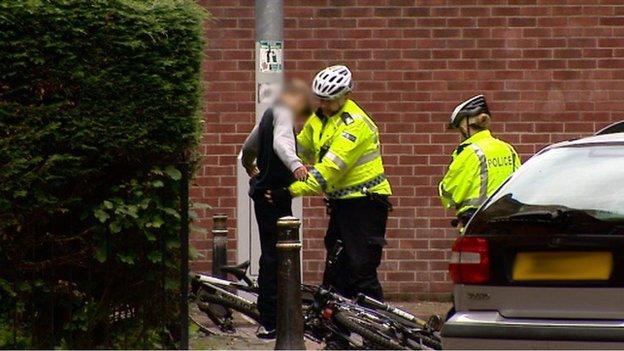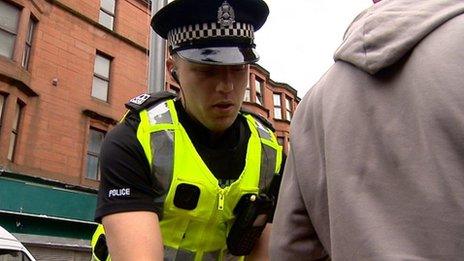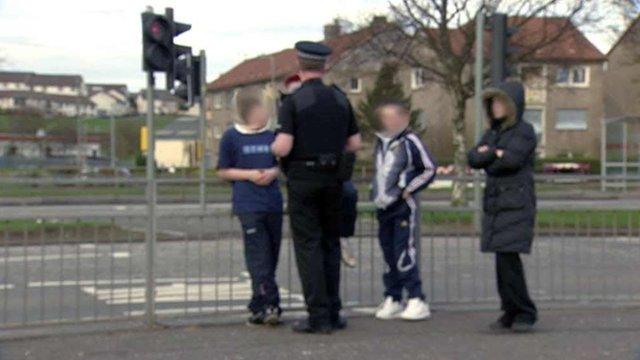Consensual stop-and-searches by Police Scotland to end
- Published

The report looked into the practice of police stop-and-search
Police Scotland is to stop carrying out non-statutory stop-and-searches of adults and children, the justice secretary has confirmed.
It comes after the Scottish government asked John Scott QC to examine the controversial practice.
His report found that ending the searches would not prevent officers carrying out their duties effectively.
A BBC Scotland investigation had found that children under 12 were being searched.
This was despite a police promise that they would not be.
Code of practice
In a statement to MSPs at Holyrood, Justice Secretary Michael Matheson said a new new statutory code of practice, as recommended by Mr Scott, would be introduced to underpin how stop and search is used in Scotland.
A consultation on the new code of practice will be held, and will also examine whether the police should have the power to search children under 18 for alcohol.
The expert advisory group led by Mr Scott will remain in place to give advice on the final version of the code of practice once the consultation is complete.
First Minister Nicola Sturgeon had requested the independent investigation by Mr Scott at the beginning of the summer.
Mr Scott's report made a series of key recommendations, which included:
a statutory code of practice covering stop-and-search which is consulted upon and regularly reviewed
regular reports from Police Scotland to the Scottish Police Authority about the use of stop-and-search, with these updates being made public to "ensure openness and transparency"
a consultation on whether a specific law should be created allowing searches of children under 18 who may possess alcohol, and that consultation should "engage effectively" with children and young people
the "formal implementation" of any changes, with necessary training programmes and a post-implementation review
that discussions should take place between Police Scotland and others, including the Scottish government, regarding the most appropriate methods of dealing with children and vulnerable adults who are subject to stop and searches.
Mr Scott said in his report: "If non-statutory stop-and-search is ended, officers of Police Scotland will still be able to carry out their duties effectively.
"Abolition will not result in any significant gaps.
"Specifically, officers will still be able to respond to any welfare or protection issues they encounter.
"Action will still be possible even when required on an emergency basis, whether carried out by police officers, social workers, medical staff or others."

ANALYSIS
By Marc Ellison, BBC Scotland data journalist

Mr Scott later told BBC Scotland that one officer he had spoken to said he used to stop and search people purely because they were carrying bags from Farmfoods.
On the day the Scott Report is published, Police Scotland released the latest quarterly data, external in not one, but two spreadsheets.
So, what did they tell us?
The first spreadsheet for April-May 2015 shows a massive reduction in the number of searches from the same period last year.
In this two-month period, officers conducted 37,162 searches - that's about the same number undertaken in just the one month of May last year.
Since BBC Scotland broke the story about the continued use of 12-year-olds being searched, the total number of searches has decreased steadily.
But not only were the number of searches halved - the number of consensual searches reduced drastically from approximately 70% to 46%.
And what's more the success rate of consensual searches during these two months improved to 30% - up from 21% for the same period in 2014.
What is more interesting is the fact that Police Scotland released a separate, second spreadsheet for the month of June. This data has been extracted from "an enhanced national database was rolled out across Scotland on 1 June 2015 together with changes to operational practice and recording procedures."
The enhanced database apparently includes additional validations designed to improve the quality of the data by preventing inaccurate data capture through "input error".
The fact that this data has been released separately serves to draw a line under how the force has recorded the use of this controversial tactic.

The Scott Report also found that officers had been required to meet targets on consensual stop-and-searches.
It said: "It seems clear that the use of targets, or KPIs, featuring stop and search, led to a proliferation in the use of the tactic, both before and following the establishment of Police Scotland.
"Even some police sources have conceded that the extent of use of the tactic took it beyond any available intelligence and best use of officer hours."
Learning disabilities
However, a spokesman for Police Scotland insisted that the force "did not have and does not have any targets around the volume of stop and search."
He added: "The number of stop searches has dropped every year of Police Scotland and the number of stop searches carried out in the final years of the eight legacy forces was higher in than the first year of Police Scotland."
In June 2014, Police Scotland told MSPs it would abolish the "indefensible" practice of consensual stop-searches for children.
However, the BBC found that it had not ended and 356 children had been searched by police. Two thirds of these were consensual, and 91% recovered no items.
The nine-strong advisory group found that people with learning disabilities were subject of stop-and-search in "situations where they did not understand at the time what was happening".
The report stated: "In one example, an individual with mild learning disability did not know whether the three searches to which he had been subjected had been statutory or non-statutory."
- Published5 February 2015
- Published4 February 2015

- Published26 November 2014

- Published19 June 2014

- Published30 May 2014
